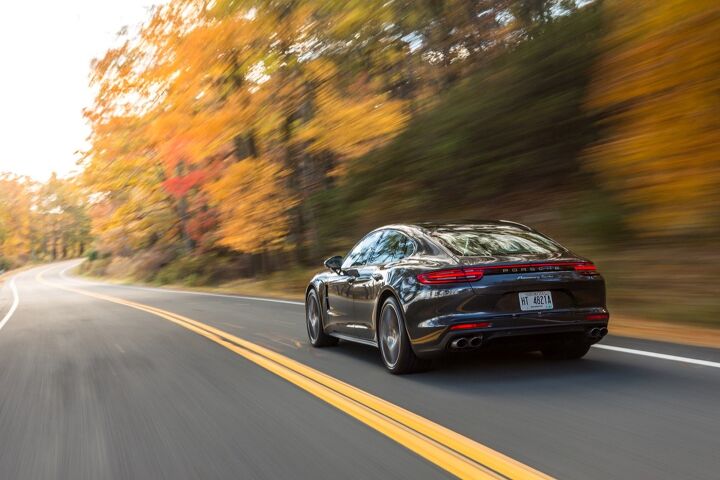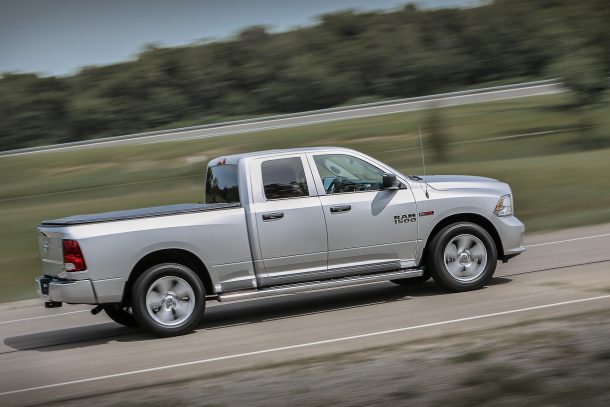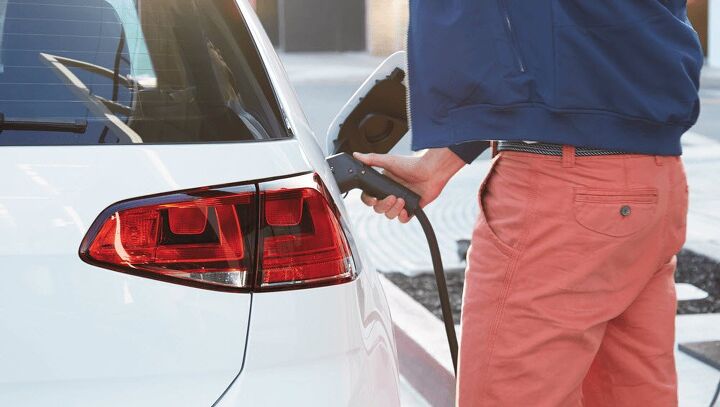#emissions
After Falling Out of Love, Porsche's Diesel Divorce Is Now Complete
It always felt little odd whenever a diesel-powered Cayenne sidled up to you next to a stoplight. A Porsche that builds SUVs, we used to mull, and diesels, no less!
The public’s discomfort with a German sports car maker entering the utility vehicle field is long gone, and we can now say the same for Porsche’s short-lived dalliance with diesels. The automaker has stated it’s pulling its last remaining oil-burning models off the market.
A new Porsche is born, cleaner, but perhaps no purer.
Can Automakers Convince Germany to Skip the Pending Diesel Bans?
Europe’s love affair with diesel engines is fading faster than a VHS tape left sitting beneath the summer sun in a car’s rear window. Encouraged by automakers, European governments incentivized diesel cars in the 1990s by taxing them at a far lower rate and suppressing the price of the fuel they burned. Studies came out claiming that diesel’s below-average CO2 emissions could even help with air quality. By 2012, diesel models made up 55 percent of Europe’s passenger vehicle market.
Things certainly have changed. Now concerned primarily with smog-producing NOx output, health and safety advocates have called diesel a menace to society. The EU has been pressing automakers to abandon the fuel by adopting much more restrictive emissions regulations for passenger cars. Volkswagen’s emission scandal further complicated things, prompting cities to call for a total ban on certain vehicles.
However, Germany still has to decide whether the mandates are even legal — and the decision comes this Thursday.
Whoops: Mercedes-Benz Diesel Probe in U.S. Uncovers Possible Defeat Device
U.S. investigators have found what could be illegal software modifications on Mercedes-Benz diesels intended to help the vehicles pass emissions testing. An engine management function called Slipguard recognized whether the car was undergoing testing procedures while another, called Bit 15, halted emissions cleaning after roughly 16 miles of driving. Together, the two pieces of software may amount to what is known within the industry as a “defeat device.”
When paired the software apparently enabled the cars to produce NOx levels up to 10 times higher than what is legally permitted. Interestingly, Mercedes-Benz issued a voluntary recall upon roughly 3 million European cars last month to reduce nitrogen oxide emissions by tweaking their electronic control units.
Feds Ready to Hit Fiat Chrysler With Big Fines: Report
Fiat Chrysler Automobiles might need the 2019 Ram 1500’s newly increased payload capability when it comes time to visit the bank.
As we’ve told you since the scandal broke a year ago, FCA could find itself on the hook for hefty penalties after the Environmental Protection Agency slammed it for failing to declare a bevy of auxiliary emission control devices on its 3.0-liter diesel V6 engine. With the 2017 and 2018 Ram and Jeep EcoDiesel models now in compliance, the question becomes: what does FCA pay to settle the fallout?
According to documents obtained by Bloomberg, it seems the monetary fine sought by the U.S. Justice Department might not fit in the pickup bed.
German Automakers 'Rearrange' Staff After Newest Diesel-related Scandal, Audi Employees See Homes Raided
Daimler AG and BMW group suspended or moved several employees linked to a group that was commissioned for research that involved exposing monkeys and humans to potentially harmful gases. While the nature of these tests may not be extraordinary or illegal, the public response has been one of outrage.
Volkswagen suspended chief lobbyist Thomas Steg earlier this week for similar reasons, but the other automakers have now followed suit in the hopes of quelling public anger. The automakers haven’t kept silent on the matter, either. High-ranking executives have called the research repugnant, suggesting that the ethics employed by the European Research Group on Environment and Health in the Transport Sector (EUGT) were unacceptable.
Green for Green: California Governor Outlines $2.5 Billion Electric Vehicle Push
If California’s Jerry Brown is known for anything, it’s for continuing his familial legacy of governing the region for a weirdly long period of time and pressing for the proliferation of electric vehicles. While not all of the state’s EV initiatives have gone without a hitch (the LAPD’s unused fleet of battery powered BMWs springs to mind), Brown remains essential in keeping his neck of the woods on the forefront of alternative energy adoption.
Currently, California plans to place five million zero-emission vehicles on the road by 2030. The state previously set a target of 1.5 million ZEVs by 2025. That’s a massive increase, especially considering California only has about 350,000 examples currently plying its roads. Don’t worry, Brown has a plan to stimulate sales: $200 million worth of subsidies per year for the next eight years.
New Vehicles Are More Powerful and Efficient Than Ever, but the Greenest Automaker Only Sells Gas Models: Study
Every year, the Environmental Protection Agency tabulates all available data for new vehicles sold in the United States and prints colorful graphs showing the country’s progress — or in some cases, regression — in key areas of autodom. Areas like average fuel economy, vehicle weight, horsepower, and emissions.
It’s a tradition dating back to the heady, wide-lapelled days of 1975.
The most recent report on light-duty vehicles in the U.S. shows definite, albeit incremental, progress towards many environmental goals. While the auto landscape may not be advancing at the rate preferred by many environmentalists, urbanists, and the Tesla fan base, there’s cause for celebration within the report’s pages. There’s also a special prize in there reserved just for Mazda.
VW Attempting to Block Emissions Audit in Constitutional Court
Volkswagen Group said on Thursday that it would be petitioning Germany’s constitutional court to overturn the appointment of a special auditor to investigate the actions of its management during its diesel emissions scandal. Appointed last November, the auditor’s goal is to establish whether or not VW’s top brass withheld information about the manipulation of vehicle emissions as they related to testing.
Even thought the automaker has said it wanted to improve transparency shortly after the scandal kicked off in September of 2015, Volkswagen wants the work of the auditor suspended prior to the constitutional-court hearing against it. This begs the question: Does VW still have something to hide or is it so fed up with the litigation surrounding “dieselgate” that it’ll do just about anything to keep officials from dredging up the past?
Older Jeep and Ram EcoDiesel Owners Won't See an Engine Fix Until at Least May
Fiat Chrysler Automobiles secured permission to sell 2017 Ram 1500 EcoDiesel and Jeep Grand Cherokee EcoDiesel models in late July, but it could be nearly a year from that date before owners of 2014-2016 models can breathe easier.
In its bid to satisfy a very angry Environmental Protection Agency, FCA agreed to remove undeclared auxiliary emission control devices from its 2017 3.0-liter diesel vehicles and offer a fix for the 104,000 already on the road. Satisfied that nitrogen oxide (NOx) levels would stay within legal limits, the EPA gave the automaker the green light. With certification in hand, new EcoDiesels began appearing on dealer lots by the end of September.
The story doesn’t end there, however. Numerous Ram and Jeep EcoDiesel owners want FCA to pay up, and it’ll be many months before FCA fixes any of their vehicles.
Nearly There: Feds Green-light Emission Fix for More Audi Diesels
The Environmental Protection Agency and California Air Resources Board have approved emissions repairs for another 24,000 Audi vehicles equipped with the 3.0-liter diesel V6.
Back in May, a U.S. District Judge ruled that if Volkswagen Group failed to obtain government approval for fixes on its emissions-cheating diesels, it would be forced to offer owners buy-backs. Keen not to spend even more money as a result of dieselgate, the company went to work on a solution — resulting in an initial 38,000 Audi and Porsche vehicles spared from the wrecking yard.
The new approval covers 2014-2016 Audi A6 Quattro, A7 Quattro, A8, A8L and Q5 diesel models. The vehicles are to have their defeat device software removed and various hardware components replaced to ensure emissions compliance. VW says it has now has a remedy for about 75 percent of its tainted 3.0-liters, and hopes to have a solution for the remaining 20,000 soon.
Moving Forward: Audi Dissolving Dieselgate Task Force
Audi CEO Rupert Stadler has announced his company will dismantle the task force assigned to investigate how many of its diesel cars came equipped with defeat devices. The company established the team after Volkswagen Group admitted to selling 11 million diesel models, through its various brands, with illegal engine management software that hid peak NOx emissions during testing.
Even though Volkswagen has found itself smack-dab in the center of another costly controversy, Stadler claims that Audi is on the cusp of wrapping up its own diesel crisis. “We will have documented and processed all the engine/transmission combinations by the end of the first quarter 2018,” the CEO told journalists at Audi’s headquarters in Ingolstadt, Germany, this week.
Automakers Formally Take Aim at California's Zero-emission Vehicle Mandate
Compared to the rest of the United States, California is on the bleeding edge of government-appointed environmentalism. When the Trump administration suggested reexamining Obama-era fuel economy and emissions standards, The Golden State was the first to complain, saying it would not be adjusting its goals just because the rest of the country may. It also has pretty serious mandate on zero-emission vehicles — one that forces 15 percent of all new vehicles sold in the state to use zero-emission powertrains by 2025.
While California isn’t alone — nine other states have followed its lead since Trump took office — it is the keystone star on America’s flag pushing to maintain expand fuel regulations. Automakers have noticed and, despite previously having agreed with President Obama’s emission standards several years back, they’re launching a counter-offensive.
Arguing before a U.S. House panel, the Association of Global Automakers complained that California’s ZEV mandate threatens a single national standard for fuel economy.
Gas Be Gone: California Working on Bill to Banish Internal Combustion Cars by 2040
California Assemblyman Phil Ting, a Democrat chairing the chamber’s budget committee, says he intends to introduce a bill that would allow the state’s motor vehicle department to register only automobiles that emit no carbon dioxide, such as battery-electric vehicles or hydrogen fuel cell cars.
The proposed legislation would ultimately ban internal combustion engines, mimicking similar actions taken by France and the United Kingdom. Ting claims that, without a plan in place, California’s attempt to dramatically reduce greenhouse emissions by 2050 will prove ineffective.
Accused VW Executive Claims to Have Been 'Misused' by Company
One of the handful of Volkswagen Group executives that have been forced to appear in front of a judge over the company’s widespread emission scandal, Oliver Schmidt, has exclaimed he was misused by his employer after issuing a guilty plea. Unless the charges are revised prior to sentencing, the former VW employee has copped to conspiracy to defraud the federal government and violating the Clean Air Act. A third charge of aiding and abetting wire fraud was rolled into the conspiracy charge.
The admission to corporate wrongdoing was made in August. However the claim that the company had taken advantage of him came later via a letter to U.S. judge Sean Cox.
PSA to GM: Pay Up for That Dirty Fleet You Sold Us
The handover of General Motors’ money-losing European division to France’s PSA Group seemed complete last July, but now the maker of Peugeot and Citroen cars isn’t happy with the bag it’s holding.
PSA claims the acquisition of the Opel and Vauxhall brands left it on the hook for massive fines, all stemming from looming European emissions regulations and the not-so-squeaky-clean state of its new holdings. The automaker’s now seeking nearly $1 billion from GM — more than half of what it paid for the brands.





























Recent Comments